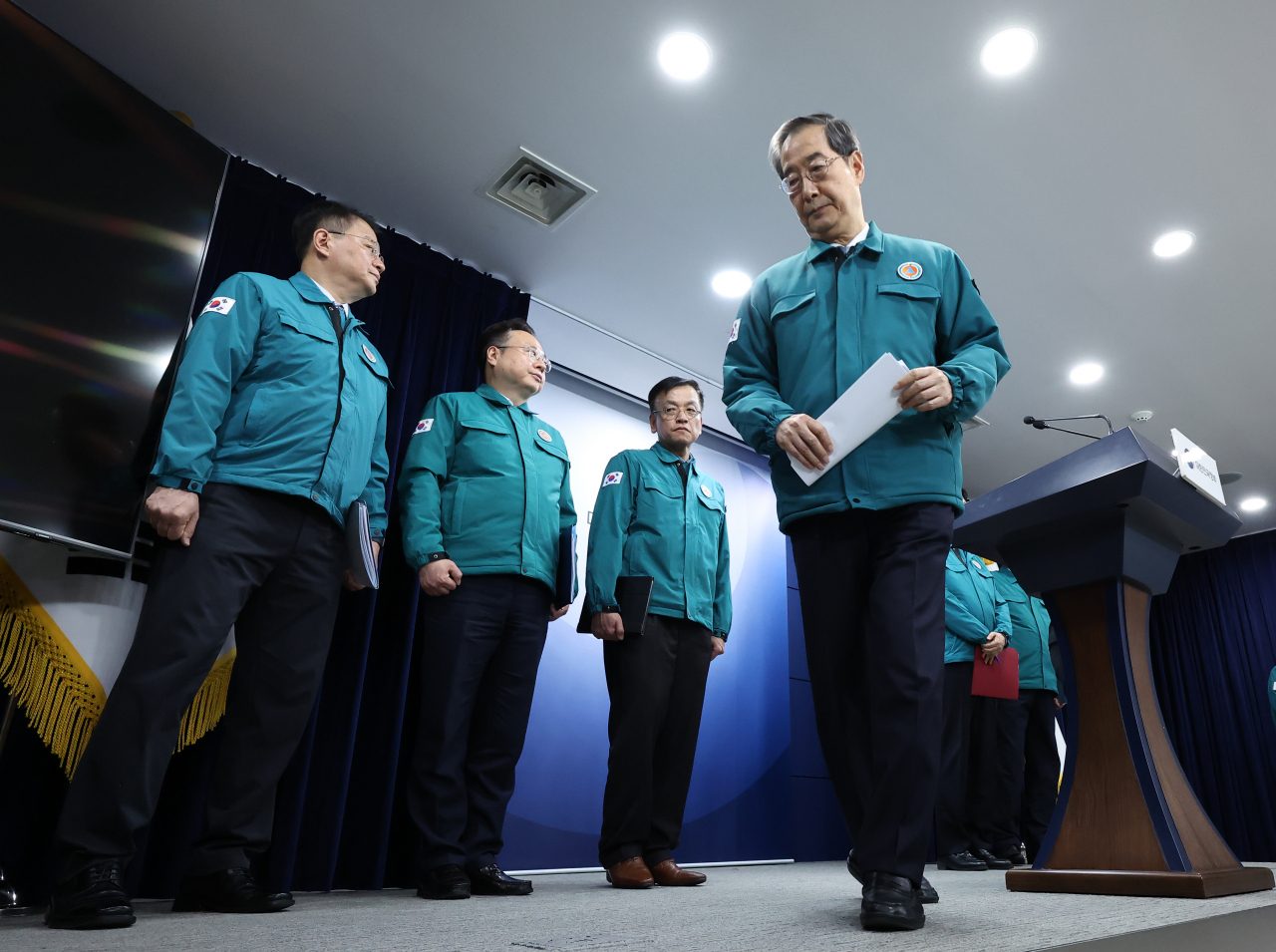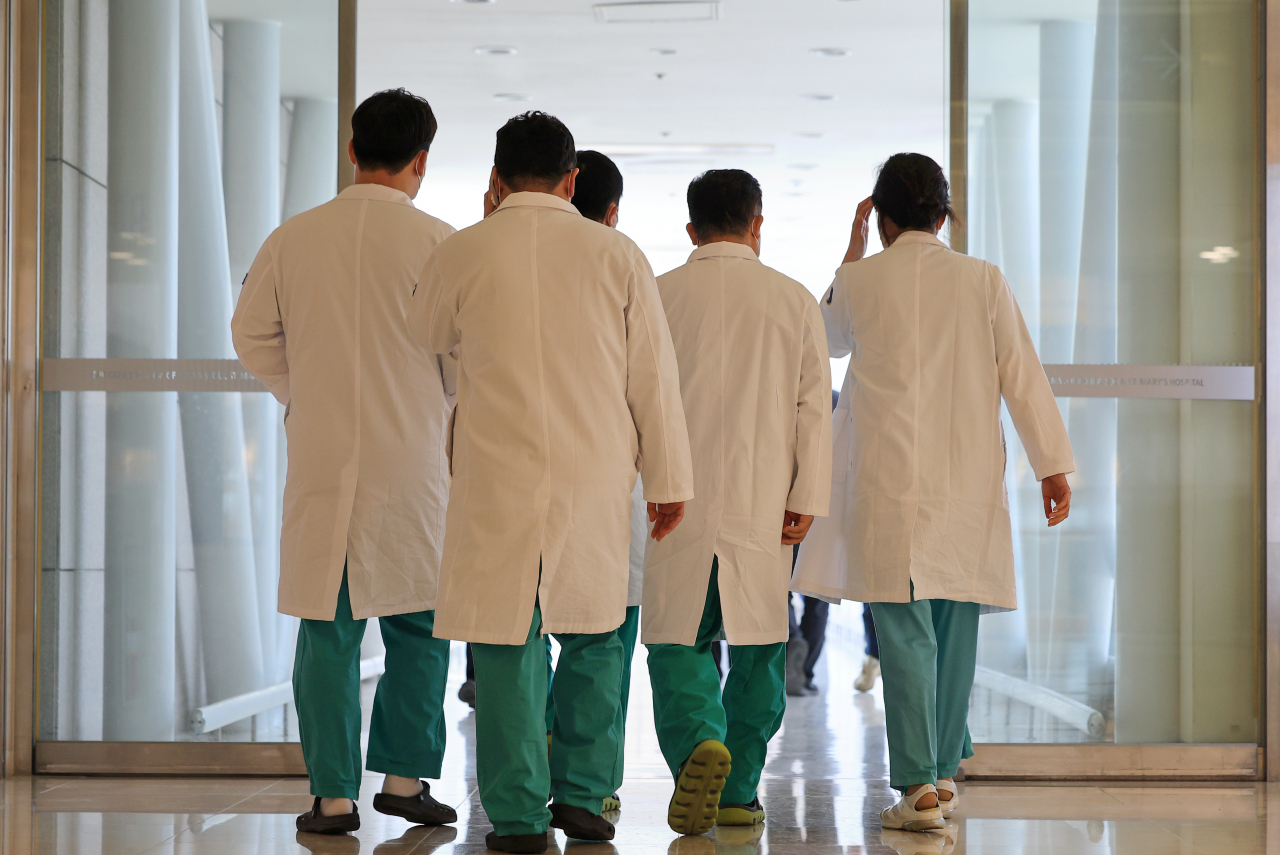Seoul piles pressure on doctors by finalizing medical school plans
Schools outside Seoul area get 82% of new seats, none inside capital
By Jung Min-kyung, Park Jun-hee
Published : March 20, 2024 - 16:20

The Yoon Suk Yeol administration on Wednesday announced the regional allocation for 2,000 new slots for students at medical schools across the country, finalizing administrative procedures for the plan it has pushed for months, despite doctors staging a large-scale walkout.
Prime Minister Han Duck-soo reaffirmed that the government’s plan, which was announced in February, fell in line with the Ministry of Education’s decision to allot 82 percent of the quota to medical schools outside of the Greater Seoul area, which includes Incheon and Gyeonggi Province, with the remaining 18 percent at schools in Incheon and Gyeonggi Province -- and none in the capital.
There are 40 medical schools across the country -- 27 such institutions outside Greater Seoul, five in Incheon and Gyeonggi Province combined and eight in Seoul. With the government completing the allocation of new seats, medical schools can now begin mapping out their admissions for 2025 -- solidifying a new reality in the field of education, rather than a plan subject to renegotiation.
“We have decided to increase the total quota (by 2,000 seats from the 2025 academic year) based on the condition of education and the reality of medical services here,” Han said in a public address.
“The allocation of the 2,000 new seats will be focused on medical schools located outside the Greater Seoul area, as well as small institutions and rural hospitals that work as medical hubs (for patients in nearby areas),” he added, underscoring the government’s goal to bridge the gap in medical service quality between the capital and rural areas.
Han reiterated the government’s goal to fill a projected shortfall of 15,000 doctors by 2035 through the plan. The prime minister stressed that the quota increase was the minimum necessary measure to prevent the possible shortfall.

“The government's (previous) decision to shrink the medical school admission quota by 351 seats led to a shortage of doctors. If we hadn’t done so, we would have gained 6,600 more doctors by now and more than 10,000 by 2035,” Han said, referring to a reduction in the quota in 2000. The quota for admissions was again reduced in 2006 by 449, and has remained at 3,058 per year since.
Han claimed that the estimated figures were based on calculations by multiple think tanks, which also suggested that Korea has become one of the world’s fastest aging societies.
The Yoon administration announced last month, after months of negotiations with doctors that failed to reach an agreement, it would increase the total number of students admitted to medical schools from the current 3,058 to 5,058. This decision was met with a mass walkout by junior doctors. More than 90 percent of 13,000 trainee doctors across the country have yet to return to work.
Critics, however, have expressed concerns of how medical schools across the country will handle the government request of a quota increase, which was addressed by Deputy Prime Minister and Minister of Education Lee Ju-ho.
"As a partner of the universities, the Ministry of Education will lend our ear to the difficulties that the universities are expected to face in increasing their admissions quota," Lee said during a press briefing on Wednesday.
Following Wednesday's announcement, the medical circle lambasted the government for causing a health care crisis.
In a bid to resolve the situation, authorities and the Korean Medical Association, the largest lobbying group for doctors, have held multiple rounds of negotiations in recent weeks, but have failed to get on the same page on a quota increase plan.
The Korean Medical Association -- the country’s largest coalition of doctors’ groups with some 140,000 members -- referred to the allocation plan as an “act that undermines the quality of the country’s centurylong medical education system.”
“Please stop forcefully pushing medical policies that continue to threaten the lives of the people. Instead, make a judicious decision so that health care can return to normalcy,” the association said in a statement.
The KMA is reportedly mulling a full-scale strike in protest of the decision, according to reports citing health authorities.
The KMA's latest statement follows its warning Tuesday that it would interpret the quota allocation announcement as the government's decision to walk away from the negotiation table.
“The government is trying to cross the river of no return,” the association said in a statement.
Medical professors at major universities have also announced that they would submit resignations en masse next week, calling for the government to adopt flexibility in its negotiations.
The emergency committee of professors at Sungkyunkwan University raised concerns that the plan will only intensify the race for students to enter medical schools nationwide.
“The side effects of the sudden and unprepared expansion in the quota will be irreversible. ... The STEM group will eventually lose ground,” the statement read. “The government shouldn’t focus on increasing the quota by 2,000, but on immediately salvaging the essential health care sector.”
Park Myung-ha, president of the Seoul Medical Association, condemned the government for pushing medical policies like a military regime.
“The reason is clear. It’s because (the government) believes it could garner more public support from residents (before the general election in April) by allocating additional seats outside the capital area,” Park told reporters as he appeared before police for questioning over his alleged involvement in instigating the walkout of junior doctors.





















